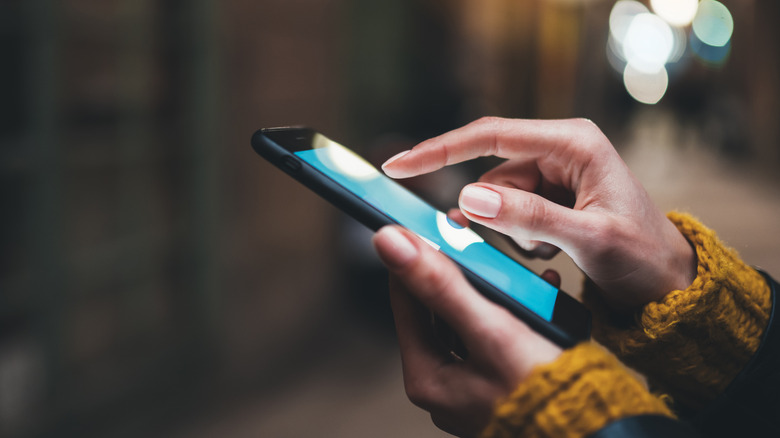Here's How Long You Really Should Spend On Your Phone Each Day
These days, it's increasingly rare to step onto a subway car and not find the vast majority of commuters glued to their mobile devices. The period between point A and B gets filled with brightly colored, chattering games, bottomless pits of news articles, Google searches for each and every whim, and never-ending social media scrolling. When you add constant communication with friends, family, and coworkers into the mix, the minutes add up shockingly fast. The negative side effects of smartphones add up too, including sleep issues, relationship woes, blows to your self-worth, and increased levels of stress, anxiety, and depression (via Business Insider).
By the end of the day, the dreaded screen time tracker proves that a hefty chunk of daylight was spent on any of the above. When you see that number — whether it's mere minutes or an entire "Lord of The Rings" movie marathon of time — you may be wondering: How much is too much? Well, wonder no more. Here's how long you should spend on your phone each day. Spoiler alert: There's no clear-cut answer, so it's really up to you.
The key is to differentiate between unconscious and intentional phone use
As Freedom notes, although the body of research conducted around smartphone use is advancing rapidly, it's still in its infancy. Therefore, researchers haven't settled on a magic number for how long you should spend on your phone. Rather, it's more about how much time is right for you. To determine this for yourself, you'll need to separate reactive unconscious behavior from intentional use. Because endless scrolling gives us mini hits of dopamine, the obsession with phones starts to look strikingly similar to addiction, according to Harvard. This is probably why we spend an average of five hours per day looking at our phones, which adds up to a whopping 35 hours per week (via Freedom).
Odds are, a big chunk of that time is spent doing unconscious behavior. To combat this and cut back on autopilot phone use, first identify your core values. They might include faith, family, finances, or health. Ask yourself: Is my phone use contributing to these values or detracting from them? Focus on using your phone in ways that support your goals. For example, if physical health is a priority, checking your Fitbit stats at the end of the day is an intentional and beneficial use of your phone. Playing Candy Crush for two hours, on the other hand, probably isn't.
What to do if your phone use doesn't align with your core values
If after taking some time to reflect, you feel that you're spending too much unconscious time on your phone, there are some things you can try. Try disabling push notifications, deleting or blocking access to time-sucking apps, limiting your phone use to certain windows throughout the day, or putting your phone in another room while you're working or spending quality time with family and friends. One strategy Time recommends is to identify specific ways you want to spend your reclaimed time. From now on, perhaps you want to spend the time between subway stops by focusing on mindfulness or getting caught up on your novel. Another solution is to set your lock screen image as some sort of reminder, such as text asking: "What for? Why now? What else?" (via Time).
Ultimately, it's all about cultivating more self-awareness around your phone use and constantly re-committing to those core values. Remember: You're the one in control.


